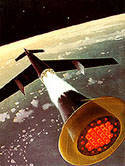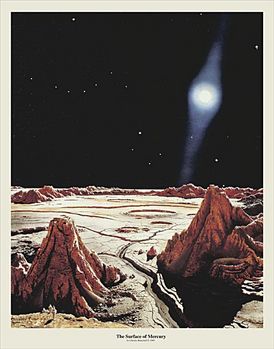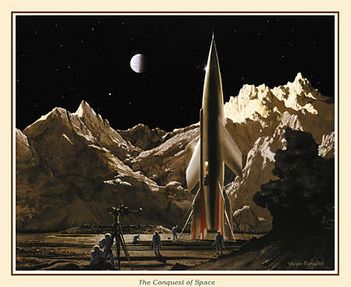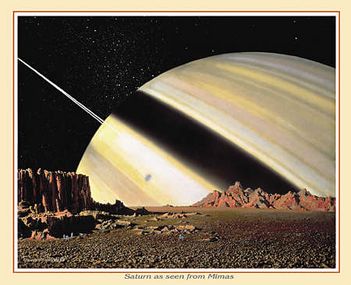Chesley
Bonestell
Born in San Francisco in 1888, Chesley Bonestell was a
visionary who studied architecture at Columbia University in New York.
One of his early jobs was to help design the facade of the city's
Chrysler Building, which quite appropriately looks like a giant
spaceship ready to blast off into space.
In the 1930s, Bonestell painted special effects mattes
in Hollywood, working on films like Citizen Kane and The Hunchback
of Notre Dame. But he had always dabbled in space art and sold
a set of
paintings of an imaginary journey to Saturn to Life magazine, which
paid him $30,000 -- a fortune in those days.
The jewel of the series was a view of Saturn from its
moon Titan, a work of art that has been so inspiring to artists, sci fi
writers, astronomers, rocket scientists and anyone else connected to
the world of space travel that it's been dubbed, "the painting that
launched a thousand careers."
Back in Tinseltown, Bonestell helped movie producer George Pal win a
special effects Academy Award for the 1950 film Destination
Moon, and he later worked on sci fi classics including War
of the Worlds, Conquest of Space and When
Worlds Collide.

Along with cosmic landscapes, Bonestell painted scenes
of space exploration on the moon, Mars and beyond, as well as
spacecraft resembling the multi-stage rockets that would transport man
beyond the realm of his own planet.
Wernher von Braun, the German rocketry genius and chief
architect of the massive Saturn V booster that catapulted men to the
moon, wrote about Bonestell: "My file cabinet is filled with sketches
of rocket ships I had prepared to help him in his artwork -- only to
have them returned to me with penetrating detailed questions or
blistering criticism of some inconsistency or oversight."
Like Merlin the magician of Camelot, Bonestell seemed to
be living backwards in time. He had an uncanny sense of what alien
landscapes looked like and the design of the vehicles that hadn't been
invented yet. Bonestell died in 1987, at the ripe age of 99. But his
art and influence continues to delight and inspire.
"Chesley Bonestell's pictures are far more than
beautiful, etherial paintings of worlds beyond," praised von Braun.
"They present the most accurate portrayal of those faraway heavenly
bodies that modern science can offer."
All
images have a Chesley Bonestell copyright by Bonestell Space Art and
are used with permission

Saturn
As Seen From Titan

The
Surface of Mercury

Conquest
of Space

Saturn
As Seen From Mimas

The
Exploration of Mars
For more about the Father of Modern
Space Art,
take the spaceship to the Chesley Bonestell
Archives

Catch a ride on the
flying saucer back
to the Outer Space Art Gallery homepage
|
